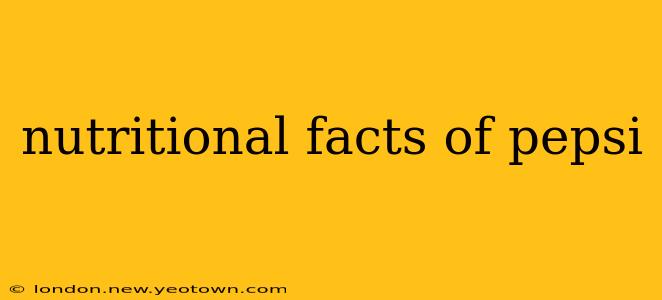Decoding the Fizz: A Deep Dive into Pepsi's Nutritional Facts
For decades, Pepsi has been a staple in refrigerators and vending machines worldwide. But have you ever truly looked beyond the familiar blue can and considered what's inside? This isn't just about empty calories; understanding Pepsi's nutritional facts can help us make informed choices about our consumption. Let's unravel the mysteries of this iconic soda.
Our journey begins with the standard nutritional information, usually found on the can or bottle itself. While specifics can vary slightly depending on the size and specific Pepsi product (diet versions, etc.), we'll focus on the common elements. Think of this as a starting point for your own explorations using your specific Pepsi product label.
What are the main ingredients in Pepsi?
Pepsi's primary ingredients are generally carbonated water, high fructose corn syrup (or sugar, depending on the formulation), caramel color, phosphoric acid, caffeine, and natural flavors. These ingredients combine to create that familiar, sweet, and slightly tangy taste. However, the exact proportions and the presence of certain artificial sweeteners can vary.
How many calories are in a can of Pepsi?
A standard 12-ounce can of Pepsi typically contains around 150 calories. This calorie count stems primarily from the sugar content. Remember that this can fluctuate slightly depending on the specific product and the serving size.
How much sugar is in Pepsi?
This is a crucial point. A 12-ounce can of Pepsi usually contains approximately 41 grams of sugar. This is a significant amount, equivalent to more than 10 teaspoons of sugar! This high sugar content contributes significantly to the overall calorie count and should be factored into your daily sugar intake.
What is the caffeine content of Pepsi?
Pepsi contains caffeine, a stimulant that can provide a temporary energy boost. The caffeine content of a 12-ounce can is typically around 38 milligrams. This is generally lower than the caffeine content found in many coffees.
Does Pepsi contain artificial sweeteners?
The standard Pepsi formula does not contain artificial sweeteners. However, PepsiCo offers Diet Pepsi and other variations that utilize artificial sweeteners like aspartame. These versions aim to reduce the sugar and calorie content while preserving the taste, though consumer perceptions of these sweeteners vary.
Is Pepsi a healthy drink?
Frankly, Pepsi, like most sodas, isn't considered a health drink. Its high sugar content contributes to potential health problems like weight gain, type 2 diabetes, and tooth decay. While occasional consumption isn't necessarily catastrophic, regular, high intake is definitely something to be mindful of.
What are the alternatives to Pepsi?
If you're looking for healthier alternatives, consider water, unsweetened tea, or fruit-infused water. These options offer hydration without the added sugar and calories of soda.
Are there any nutritional benefits to Pepsi?
Truthfully, no. Pepsi primarily provides carbohydrates in the form of sugar and caffeine. It lacks significant vitamins, minerals, or other nutrients beneficial to health.
In conclusion, while Pepsi can offer a momentary burst of flavor and refreshment, its nutritional profile highlights the importance of mindful consumption. Understanding the ingredients and nutritional facts empowers us to make informed decisions about our beverage choices and maintain a healthier lifestyle. Remember to always check the specific nutritional information on your Pepsi can or bottle, as slight variations can occur.

